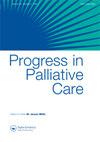公民喜欢谈论死亡和学习临终关怀——一项对5469名临终援助课程参与者的观点和经历进行的混合方法研究
IF 0.8
Q4 PUBLIC, ENVIRONMENTAL & OCCUPATIONAL HEALTH
引用次数: 11
摘要
大多数人宁愿死在家里。让公民参与临终关怀可能有助于使更多的人有可能在家中死亡。目的测试临终援助课程在不同国家的可行性和可接受性,并探讨参与者对课程的看法和经验。方法采用问卷调查法设计国际多中心研究。408 .最后援助课程在三个不同的国家举办。在6014名课程参与者中,有5469人参与了研究,应答率为91%。结果参与者的中位年龄为56岁。88%是女性。76%的参与者认为课程“非常好”。99%的人会推荐给别人。定性数据的结果显示,参与者发现氛围舒适;教练主管;赞赏课程的形式、持续时间、主题和关于生与死的讨论。结论临终救助课程是可行的,并为各国公民所接受。他们有巨大的潜力告知公民并鼓励他们参与家庭护理。未来的研究应调查课程对参与者提供临终关怀的能力和意愿的长期影响,以及对在家死亡人数的影响。本文章由计算机程序翻译,如有差异,请以英文原文为准。
Citizens appreciate talking about death and learning end-of-life care – a mixed-methods study on views and experiences of 5469 Last Aid Course participants
Background Most people would prefer to die at home. Engaging citizens in end-of-life care may contribute to making home death possible for more people. Aims To test the feasibility and acceptability of Last Aid Courses in different countries and to explore the views and experiences of participants with the course. Methods International multi-centre study with a questionnaire based mixed methods design. 408 Last Aid Courses were held in three different countries. Of 6014 course participants, 5469 participated in the study accounting for a response rate of 91%. Results The median age of participants was 56 years. 88% were female. 76% of participants rated the course “very good”. 99% would recommend it to others. Findings from the qualitative data revealed that participants found the atmosphere comfortable; instructors competent; appreciated the course format, duration, topics and discussions about life and death. Conclusions Last Aid Courses are both feasible and accepted by citizens from different countries. They have a huge potential to inform citizens and to encourage them to engage in care at home. Future research should investigate the long-term effects of the course on the ability and willingness of participants to provide end-of-life care and the impact on the number of home-deaths.
求助全文
通过发布文献求助,成功后即可免费获取论文全文。
去求助
来源期刊

PROGRESS IN PALLIATIVE CARE
PUBLIC, ENVIRONMENTAL & OCCUPATIONAL HEALTH-
CiteScore
2.60
自引率
11.80%
发文量
24
期刊介绍:
Progress in Palliative Care is a peer reviewed, multidisciplinary journal with an international perspective. It provides a central point of reference for all members of the palliative care community: medical consultants, nurses, hospital support teams, home care teams, hospice directors and administrators, pain centre staff, social workers, chaplains, counsellors, information staff, paramedical staff and self-help groups. The emphasis of the journal is on the rapid exchange of information amongst those working in palliative care. Progress in Palliative Care embraces all aspects of the management of the problems of end-stage disease.
 求助内容:
求助内容: 应助结果提醒方式:
应助结果提醒方式:


